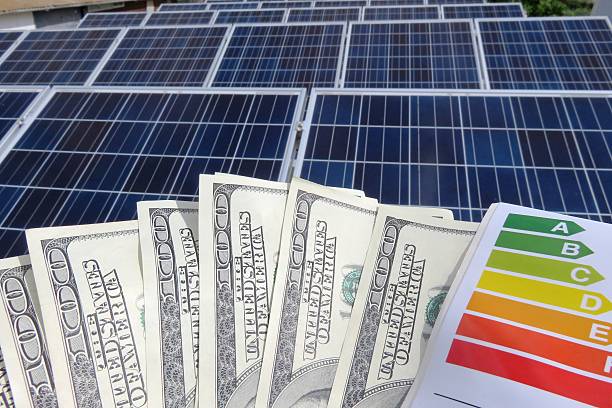
The majority of people are in agreement that Solar Power provides a more cost-effective, reliable, and sustainable way to power our homes. What is the barrier for most? Solar financing.
Solar panels are investments, but their costs have decreased dramatically in recent years. They’re also quite affordable, thanks to the monthly financing options. It’s not surprising that people are becoming more interested in solar commercial as well as home installation.
We’ll look at some of the common solar panel financing options, such as:
- Cash
- Loans
- Home Equity
- Power Purchase Agreements (PPAs),, and solar panels leasing
- Tax Benefits and Rebates
SOLAR PANEL FUNDING OPTIONS
You might be surprised at the number of ways you can pay for solar. Cash, loans, and PPAs may be the most popular solar financing options. However, don’t forget about government incentives, cash out refinance, and home equity line of credit (HELOC).
CASH
Solar is an investment that offers high returns for those with cash saved. You can also reap some serious benefits by paying for solar panels with cash:
- Reduce your monthly bill immediately
- Avoiding the interest charged by other solar financing options can save you thousands of dollars
- Take advantage of rebates and incentives from the state and federal governments.
If you intend to stay in your house for a long time, paying in cash will be a smart move. The investment will continue to pay off in the future.
BILL SWAPPING
Don’t worry if you can’t afford to buy solar panels upfront. You can pay off your solar panels over time using a variety of options.
This option is often called a “bill exchange” because it involves swapping out your electric bill in favor of your solar financing payment.
The two payments are not necessarily the same. The idea is: If you have the money to pay for your monthly energy bill, it is much more realistic to use that money towards a solar payment.
Solar has the added benefit that it caps your monthly payments for the entire duration of your loan. The solar system also protects you from rising energy prices that are not covered by your traditional energy bill.
Here are some options you have for swapping solar bills.
LOANS
Solar panels can be installed and used immediately with a loan. You can pay for them over time by making monthly payments plus interest.
Some loans only require a small deposit, or none at all. Solar panels are now affordable for a larger percentage of people.
You will pay more money in interest if you finance your solar installation through a loan. Compare solar panel financing rates. Don’t forget about the different loan types available.
Home Equity
You can also borrow from your equity if your home has appreciated in value since you purchased it. This is done through a HELOC or cash-out refinance.
A refinance allows you to replace your current mortgage with a bigger one. The difference between the old loan balance and the new loan amount is yours to spend on whatever you like, including solar panels.
HELOCs allow you to use your equity in the same way as a credit card. You can borrow up to the amount you need for solar installation and not pay interest. You’ll probably have a variable rate of interest, which means that your monthly payment could fluctuate.
PPAS OR SOLAR LESSES
Some states allow homeowners to finance solar panels by solar leasing or private purchase agreements.
Solar leases or PPAs are similar to leasing a vehicle. No upfront costs are required. A third party installs and owns your solar panels system. Then, you’ll pay for their energy every month.
Solar leases and PPAs are primarily a cost-savings tool. You will save money on your electricity bill — usually between 10% and 30%, as well as the maintenance. You are not responsible for servicing the solar system because you do not own it.
You’ll also have the satisfaction that you are using an alternative, clean energy source.
The downsides.
Although you will pay less each month for your energy, these payments do not represent an investment in a system that you will eventually own. You’re also spending money that you won’t see again, just like with traditional energy bills. You can’t benefit from incentives and rebates because you don’t own the system.
Selling a house with solar panels leased could be difficult. It’s possible that the new buyer will not want to buy solar panels. Even if they are interested, ownership may not be transferable. You could be charged expensive removal fees and termination charges if you have to remove the panels.
Tax Benefits and Rebates
Finaly, there are a variety of tax incentives and rebates that can help you lower the price of your solar panels. These incentives will not finance your solar installation in full, but you would be remiss if you ignored them.
The federal government, for example, offers a tax credit which allows homeowners to deduct 30 percent of the cost of their solar system from their income tax. This is a significant amount.
There are also state rebates and incentives, as well as additional federal incentives. Explore all your options. Maximize your savings by taking advantage of everything that is available to you.
Which solar financing option is best?
The best option for financing solar panels depends on your individual situation and needs.
You can save the most money if you pay for solar panels with cash. If you are unable to pay upfront, loans, cash-out refinances and HELOCs can be a good option. Compare solar panel financing rates in order to find the best possible deal.
If you don’t have the money to invest right now in solar but still want to take advantage of alternative energies, then a lease, or PPA, might be your best option, depending on what is available in your state.
FREEDOM SOLAR CAN HELP YOU FINANCE YOUR SOLAR POWER.
You need a bit more help? We at Freedom Solar are here to assist you in finding the best financing option for your solar panels.
We can work together to create a financing plan that fits your budget, whether you want to pay outright or put no money down. Our 25 year warranty plan will make your solar panel investment well worth it.
